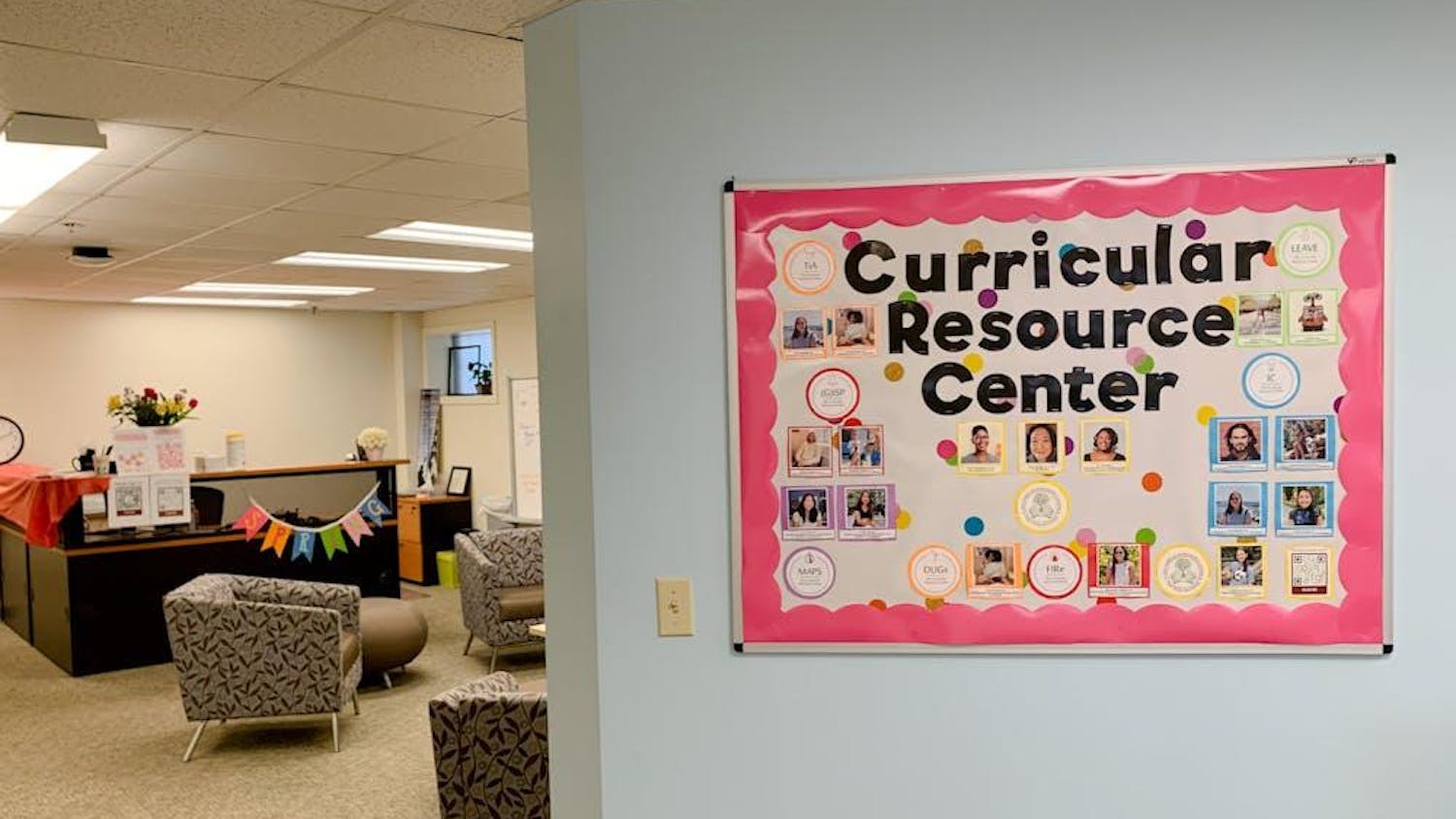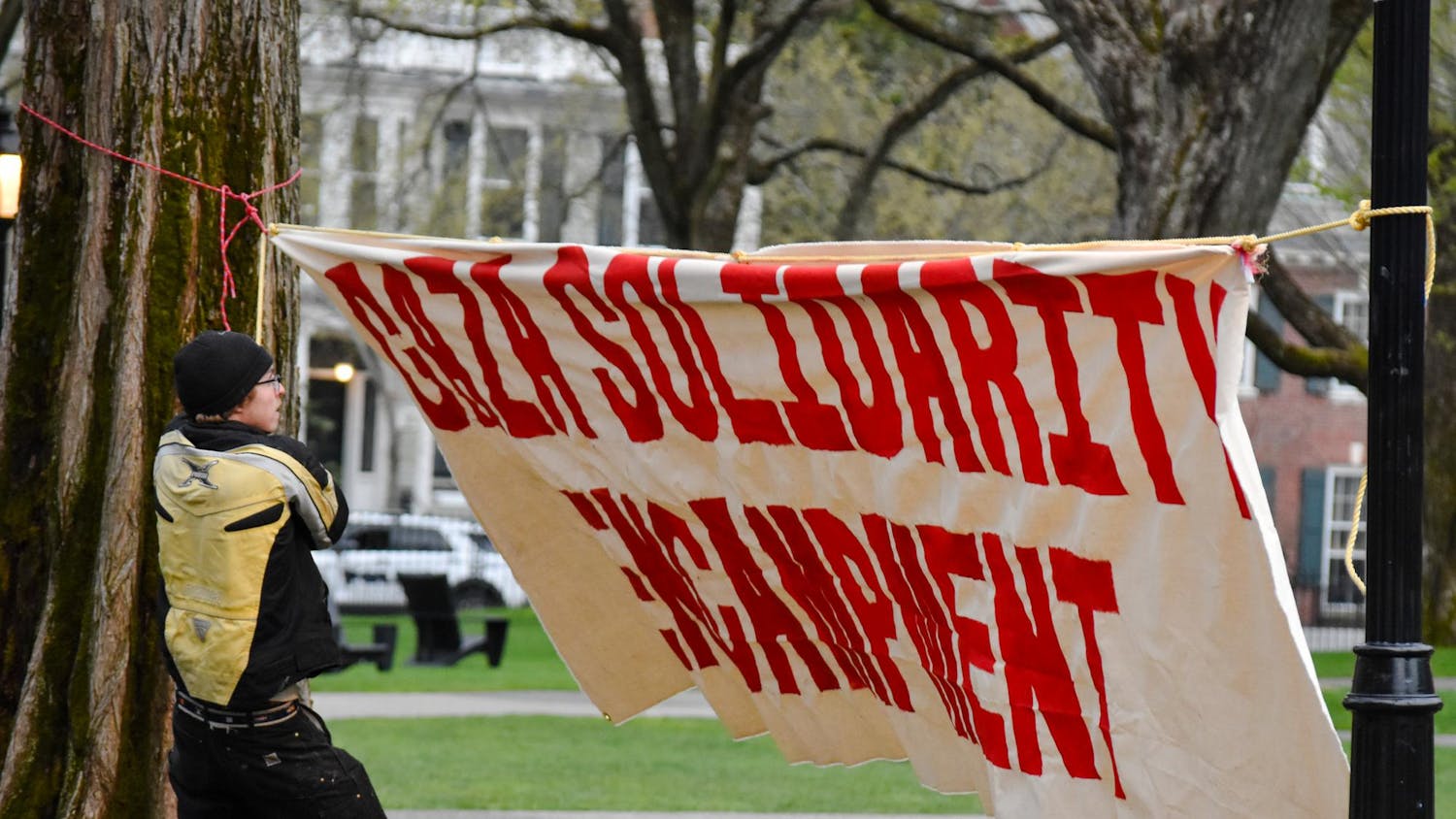Correction appended.
Filmmakers and enthusiasts alike enjoyed a taste of Hollywood on campus last week. The Ivy Film Festival celebrated its 10th anniversary with a week of advance film screenings, student films, industry panels and talks by two established members of the industry.
Friday's talk by actor James Franco and Saturday's keynote speech by Academy Award-winning screenwriter Aaron Sorkin were the two most popular events of the festival.
Behind the scripts
After a 30-minute delay, Sorkin did not disappoint. His talk — moderated by Sam Marks, visiting lecturer of literary arts — kept the audience roaring with laughter. Sorkin discussed his experiences working on "The Social Network," "The West Wing" and "Studio 60 on the Sunset Strip," weaving in humorous personal anecdotes.
He said he only wrote one draft for "The Social Network." He praised director David Fincher for his ability to make scenes of Mark Zuckerberg typing "look like bank robberies." Sorkin said he felt a particular affection for Zuckerberg because he considers himself "socially awkward" as well.
"I'm the dumbest in my family," he said. "I grew up surrounded by people that are smarter than I am. … I really liked the sound of intelligence. I wanted to be able to imitate that sound." When he writes screenplays, he asks himself whether it would appeal to him, his friends and his father, rather than to the mass population, he said. When asked about the political motivations behind his work, Sorkin replied he does not have a political agenda. "My fidelity is entirely to storytelling," he said. "My education and experience is entirely in writing, not in politics."
But he did have strong views on social networking, which he said had a "lack of sincerity" and is more performance-oriented than personal.
Sorkin also expressed concern that reality television is "making us nationally, collectively dumber and meaner," another idea that resonated with the audience.
He touched upon the writing process during his talk, explaining that starting is the most difficult part. He said he uses index cards to help him write. His first play, "A Few Good Men," was written on cocktail napkins while he worked as a bartender, he said.
"I'm the first person to play all the parts," he said. "I'm very active when I'm writing — talking out loud, jumping up and down."
Akiva Goldsman, Oscar-winning screenwriter of "A Beautiful Mind," taught him that it is also important to "fall out of love with the book" and create something new when adapting a novel into a screenplay, he said.
Students asked him about his favorite episode of "The West Wing" and what went wrong with "Studio 60 on the Sunset Strip." Sorkin said he could not name a favorite West Wing episode but pointed to a unique episode in response to 9/11. The early end to "Studio 60 on the Sunset Strip" was his own fault, he said, but was canceled for commercial reasons.
Sorkin also spoke about his next project, "More as the Story Develops," a television show he described as a current version of "The West Wing," but with a focus on journalism instead of government.
An insider's view on acting
The line to enter Salomon for Franco's talk stretched across the Main Green to the George Street gates. Moderated by renowned journalist Charlie Rose, the talk began with short clips from Franco's works. The audience cheered at his scenes from "Spiderman," "Milk" and "127 Hours." Franco then talked about his experiences working with Oscar-winning director Danny Boyle and some of his earlier appearances on "Freaks and Geeks" and "General Hospital."
Franco said he initially felt frustrated that as an actor he did not have more control over the direction of the piece, which led him to find other outlets for his creative energy. He said he came to understand that directors have to collaborate with many different departments and do not want "actors that (they) have to fight with on set."
Rose asked Franco about how his continuing experiences in academia have informed his career. Franco replied that working with his favorite writers in university settings was akin to working with great directors such as Boyle.
"Some bloggers like to say I'm a super weird guy," he said. "But what is so weird about going to school? I could be doing a lot weirder things."
Franco, who is also a writer and painter, said he enjoys finding the best form through which to deliver his subject matter and blending different mediums to examine their interactions and limitations. He does not feel like he needs to be the best at everything but approaches each pursuit in a humble way, "trying to bring something genuine to each," he said.
"Embarrassment is something that used to hold me back," he said. "But now I don't care as long as my intentions are pure … if that means I'm going to fall, that's OK. I'm going to take that risk."
He became a little more tense at the mention of the Oscars, which he said were a sensitive topic because of the "vicious" response his hosting drew from critics.
"I went out there and I tried to deliver those lines as well as I knew how," he said.
Jacob Ramos '14 told The Herald he appreciated James Franco's "obsession with academia" but was disappointed with the level of questions by Brown students. One student asked whether Franco would be interested in smoking marijuana after the talk, a question Franco brushed aside.
"We've never had two keynote speakers of this caliber," said Max Gindi '11, programming coordinator for IFF. "It's the most packed schedule we've had."
IFF was able to bring Franco and Sorkin to speak through personal connections such as Thomas Rothman '76 P'11 P'13, co-chairman and CEO of Fox Filmed Entertainment, said Debbie Lai '12, co-executive director of IFF. "He's always been a great supporter of the IFF," she said.
Aspiring filmmakers
Members of the IFF staff received hundreds of student submissions and 31 movies to screen on Friday and Saturday. This year, the festival had a particularly diverse range of submissions from around the world, said Travis Bogosian '13, programming coordinator. The final selections were made based on the quality of the writing, acting, cinematography and story, he said.
Many student films had a haunting and dark feel. "Exclusive," based on a short story by acclaimed Israeli author Etgar Keret, brings together the hopelessness of a breakup with the horror of everyday crime.
Two films by students of the American Film Institute were particularly poignant. "Thule" describes the sinking sense of despair and detachment that a group of men experience at an Air Force base in Greenland. "Clear Blue" brought in a fantastical element as it showed the encounter between the lifeguard at a community pool and the mysterious mermaid who swims in it. The festival also featured documentaries about cycling in Boston, a Kenyan refugee camp and animations about a cruel bird couple and a thoughtful elephant.
"Some were entertaining, some were educational and some were just OK," said Daniel Goodman, a prospective graduate student who attended the screenings.
"I thought they were really good — we don't have a film festival at Tufts," said Neha Agrawal, co-director of the film "Between the Curbs."
This year, the festival debuted the new social change award. "We really want to encourage people to think of films not just as entertainment but as a way to communicate a message," Lai said.
During a panel discussion featuring young filmmakers and producers Friday, independent filmmaker Andrew Renzi, director Antonio Campos and producer Josh Mond stressed the importance of internships and experience in the film industry. They discussed the difficulties faced in funding a film and suggested that aspiring filmmakers search for gra
nts and be as honest as possible with potential investors. Knowing how to write a good synopsis of the film is crucial when trying to raise funds, Renzi said.
Exemplar feature films
Throughout the week, advance screenings of feature films were also shown — many of which were previously featured at the Sundance Film Festival. Cara Marcous '97 answered audience questions after the Wednesday screening of "On the Ice," a film she produced. Shot in Barrow, Alaska, the movie tells the story of two teenage boys who accidentally murder their friend and try to bury their guilt along with their shared secret. The film features beautiful shots of the vast, frozen and empty landscape of Alaska, a backdrop that highlights the teens' growing isolation. Marcous discussed the challenges of shooting in the cold Alaskan climate and the struggle between the traditions of the elder members of the Native American community, the Inupiaq and the hip-hop culture of the youth in the small Alaskan town.
Friday's screening of "Ceremony" featured a question-and-answer session with director Max Winkler and lead actor Michael Angarano. The indie romantic comedy stars Uma Thurman, who plays the older woman that Angarano's character Sam tries to steal back at her wedding. The audience was entertained by the many lighthearted moments of the film, such as when Sam cracks a pun about shellfish in the middle of a tense, emotional scene. After the screening, Winkler and Angarano discussed the characters and their experience working together. They interacted jovially with audience members as they answered questions about their inspirations, the challenges they faced and the music they selected for the film. Angarano described working on the film as a "cathartic experience" and recounted how he broke down crying listening to Bob Dylan after the last day of filming.
"A lot of the great lines were improvised," Winkler revealed, adding that he will start working on his next film in the fall.
"This movie might be one of my favorites," said Soma Chea '14, who said he will continue to follow Winkler's works after being impressed by "Ceremony."
The festival concluded Sunday with a brunch featuring performances of student screenplays.
"The overall quality (this year) was higher than ever before," said Hannah Levy '13, screenplay co-coordinator. The screenplays covered topics including Hurricane Katrina and the relationship between mother and son.
The festival aimed to allow aspiring filmmakers to gain exposure to industry guests, Lai said.
"It is a great and unique celebration of films that you don't see on this scale at any other university," Levy said. "We hope to inspire young filmmakers and get the community excited about film."
A previous version of this article incorrectly identified Hannah Levy '13 as screenplay coordinator. The Herald regrets the error.




